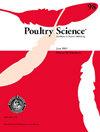饲养蛋鸡:早期环境的复杂性和遗传应变对龙骨大小和骨折有终生影响。
IF 3.8
1区 农林科学
Q1 AGRICULTURE, DAIRY & ANIMAL SCIENCE
引用次数: 0
摘要
龙骨损伤(KBD)是蛋鸡福利方面的一个主要问题。育雏期间的环境复杂性被认为可促进骨骼发育并减少KB骨折(KBF)。我们研究了饲养环境和遗传株对KB发育和健康的影响。连续三群重复的褐羽(B)和白羽(W)蛋鸡(每群 3000 只)在低、中、高三种复杂度的育雏禽舍和传统笼舍(Conv)中饲养。1 号和 3 号鸡群的小鸡(每群 1080 只)随后被饲养在 24 个带家具的笼子中(小笼:30 只;大笼:60 只)产卵。对小母鸡和母鸡样本的评估如下:1 号和 2 号鸡群于 6、11 和 16 窝龄期进行剖检,以确定 KB 大小;1 号和 3 号鸡群于 30、50 和 70 窝龄期进行拍片,以确定 KBD;3 号鸡群于 70 窝龄期进行剖检,以确定 KBD。饲养复杂程度影响小鸡的KB大小(Conv < High < Mid, Low; P< 0.0001)。在整个饲养过程中(应变 x 年龄,P= 0.005)和 70 WoA 时(P< 0.001),根据体重调整后,W 型小鸡的龙骨比 B 型小鸡大。产蛋结束时KBF的发生率受饲养复杂程度的影响(高 < 低,Conv,P= 0.002)。产蛋期间,KBF的严重程度受饲养复杂程度(高<低,中;P= 0.007)、品系(W<B;P<0.0001)和年龄(30<50<70WoA;P<0.0001)的影响。在 70 WoA 时,饲养与应变的交互作用会影响 KBF 的严重程度(最严重:B-Conv,最不严重:B-Mid 和 W-High,P= 0.003)。从X光片和解剖图中得出的KBF严重程度评分有一定的对应关系(r= 0.547,P< 0.0001)。KB偏差的严重程度受饲养笼大小的影响(大笼>小笼,P= 0.049)。总之,饲养的复杂程度和应变会影响KB的大小以及骨折的严重程度和发生率。这些数据证实,已知可促进运动的复杂饲养鸟笼可降低整个产蛋期KBF的严重程度和流行率。本文章由计算机程序翻译,如有差异,请以英文原文为准。
Rearing laying hens: Early environmental complexity and genetic strain have life-long effects on keel bone size and fractures
Keel bone damage (KBD) is a major welfare concern for laying hens. Environmental complexity during rearing is suggested to promote skeletal development and reduce KB fractures (KBF). We investigated the effect of rearing environment and genetic strain on KB development and health. Three consecutive replicate flocks of brown (B) and white-feathered (W) layer chicks (3000/ flock) were raised in three styles of rearing aviaries of Low, Mid, or High complexity and in conventional cages (Conv). Pullets from flocks 1 and 3 (1080/ flock) were subsequently housed in 24 furnished cages of two sizes (small: 30 vs large: 60 birds) for lay. Samples of pullets and hens were assessed as follows: Dissections at six, 11, and 16 WoA in flocks 1 and 2 for KB size, radiographs at 30, 50, and 70 WoA in flocks 1 and 3, for KBD and dissections at 70 WoA in flock 3 for KBD.
Rearing complexity affected KB size of pullets (Conv < High < Mid, Low; P< 0.0001). W pullets had larger keels than B when adjusted for body weight throughout rearing (strain x age P= 0.005) and at 70 WoA (P< 0.001). KBF prevalence at end-of-lay was affected by rearing complexity (High < Low, Conv, P= 0.002). During lay, KBF severity was affected by rearing complexity (High < Low, Mid; P= 0.007), strain (W < B; P< 0.0001) and age (30 < 50 < 70 WoA; P< 0.0001). At 70 WoA, an interaction of rearing by strain affected KBF severity (most severe: B-Conv, least severe: B-Mid and W-High, P= 0.003). KBF severity scores from radiographs and dissections corresponded moderately (r= 0.547, P< 0.0001). The severity of KB deviations was affected by the size of the furnished cages (large > small, P= 0.049).
In conclusion, rearing complexity and strain affected KB size and fracture severity and prevalence. These data confirm that complex rearing aviaries that are known to promote exercise reduce KBF severity and prevalence throughout lay.
求助全文
通过发布文献求助,成功后即可免费获取论文全文。
去求助
来源期刊

Poultry Science
农林科学-奶制品与动物科学
CiteScore
7.60
自引率
15.90%
发文量
0
审稿时长
94 days
期刊介绍:
First self-published in 1921, Poultry Science is an internationally renowned monthly journal, known as the authoritative source for a broad range of poultry information and high-caliber research. The journal plays a pivotal role in the dissemination of preeminent poultry-related knowledge across all disciplines. As of January 2020, Poultry Science will become an Open Access journal with no subscription charges, meaning authors who publish here can make their research immediately, permanently, and freely accessible worldwide while retaining copyright to their work. Papers submitted for publication after October 1, 2019 will be published as Open Access papers.
An international journal, Poultry Science publishes original papers, research notes, symposium papers, and reviews of basic science as applied to poultry. This authoritative source of poultry information is consistently ranked by ISI Impact Factor as one of the top 10 agriculture, dairy and animal science journals to deliver high-caliber research. Currently it is the highest-ranked (by Impact Factor and Eigenfactor) journal dedicated to publishing poultry research. Subject areas include breeding, genetics, education, production, management, environment, health, behavior, welfare, immunology, molecular biology, metabolism, nutrition, physiology, reproduction, processing, and products.
 求助内容:
求助内容: 应助结果提醒方式:
应助结果提醒方式:


